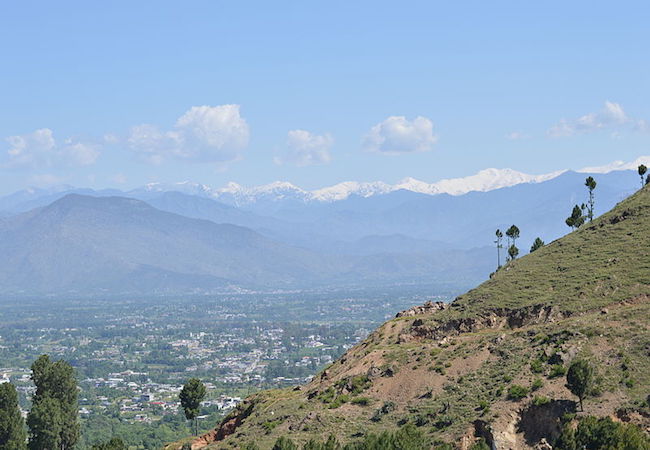
By Syeda Asma Hussain
Climate change is among one of the paramount environmental, social and economic threats facing the planet.The climate of the Earth has rampant changes that are of extreme significance while evaluating the whole climatic changes. In the past it has altered as a result of natural causes. Climate change is a term used for occurring current climatic changes in earth’s atmosphere that were observed back in the start of 19th century. The changes that we are observing over recent years and those that are predicted over the next 80 years are thought to be mainly as a result of human behavior (patterns) rather than due to natural changes in the atmosphere.
In 1988 the Intergovernmental Panel on Climate Change (IPCC) was set up to assess information on climate change and its impact. The Third Assessment Report by IPCC predicts global temperature increase by the end of the century of between 1.4C and 5.8C. The problem of the changing in climate of the earth is very complex and some of those changes are uncertain, temperature increase is expected to affect countries throughout the World and have a much impact on precipitation and sea level rises. Environmental experts believe that the faster the climate changes, the greater the risk will be. The IPCC announced in 2001 that ;
‘Most of the warming observed over the last 50 years is likely to be attributable to human activities’.
Climatic threats are not limited to only calamities and casualties but the phenomenon has gained a growing realization across the globe.it is an irony for a country whose 75% economy is based on agriculture. Recent floods ruined the standing crops which led to the shortage of grains and fresh frites. This mal-nutrition has a gigantic effect on our economy and the humans’ related to the agriculture sector. Drought and floods (hydrological disaster) has become a usual phenomenon. This situation requires holistic, comprehensive and integrated solutions as solutions should be climate smart and development smart. Climate change is directly proportional to the development of the country as these factors are the basic accelerators of the process and the Pakistan is facing. 0.8% is climatic injustice that has been done so far with this threat. Pakistan should lobby with the countries which are facing the same threat as Turkey and Malaysia.
The Vision 2025 Pakistan; has some solutions to these climatic threats that were developed by Planning and reform commission of Pakistan that may include construction of water reservoirs on war-footing grounds that is critical to Pakistan’s economy. Developing new irrigation techniques to reduce vulnerabilities by constructing smart infrastructures.
Pakistan has approved many environmental agreements and resolutions by rectifying or even signing them but nevertheless environmental problems stand as massive challenges to it. Because these policies are not translated into actions in a right way. There are multiple reasons which hinder Pakistan’s way to a green country, but two of the crucial reasons which demand immediate attention are absence of political commitment and the other one is lack of environmental awareness among masses. Apart from that Pakistan has already so much to deal with such as poverty, political unrest, terrorism etc. that environmental conservation had not been given its due attention.
In Pakistan promulgation of pro-environmental behavior is still in its embryonic stage. Limited studies have been conducted so far. More over studies have focused on the Pakistani consumerism and green advertising. As the environmental conditions of Pakistan deteriorates it demands immediate attention towards the propagation of pro environmental behavior concepts among its masses. People must understand that behavioral change is a vital element of sustainability. In order to have a prosperous tomorrow for their upcoming generations they must adopt pro environmental behavior.
The environmental vulnerabilities and the human behavior over the last century has changed the earth’s climatic patterns. There is strong evidence that most of the warming observed in the last 50 years is attributed to human malpractices. The impacts should vary among regions, but they cannot yet be predicted accurately. However, it is expected that:
- The greenhouse gases emission is the main threat to the tendency for the earth to warm.
- The changing warming factors may lead to the more the adverse effects will dominate.
- Higher the possibility, although probably remote, of large-scale and possibly irretrievable impacts.
Therefore, although an acceptable level for greenhouse gases has not yet been determined, reducing emissions should reduce the risk of adverse effects. Many options for emission reductions are available and need to be balanced with the risks left for future generations.Various studies have proved that behavioral changes are easy to make at young age keeping this fact in mind early educational curriculum must include basic environmental science concepts and specifically how humans can manage their conduct and environment in order to live sustainably. The concept of frugality must be inculcated among children at very young age so that they grow into altruistic and responsible being. Various pro environmental activities such as planting a tree with a student’s name plate, how to make a recycled paper, celebrating environment day etc. should be conducted to make students environmentally concerned.Organic farming must be promoted it is undoubtedly time consuming but its pros are worth it. It will not only create employment opportunities but will also be diversifying Pakistan’s economy. Research has revealed organic food to be more nutritious then inorganic. Apart from that it is completely environmental friendly as compared to its inorganic counterpart which involves the use of pesticides, synthetic fertilizers etc.At household level, concept of composting and kitchen gardening must be encouraged. Government can take initiatives such as distributing free composter bins can be distributed along with seeds of various vegetables which can be sown in the garden/backyard to promote the concepts of composting and kitchen gardening. Government must introduce various eco-friendly businesses with incentives, subsidies to promote green products and punishments must be indicted against violation of environmental laws.




